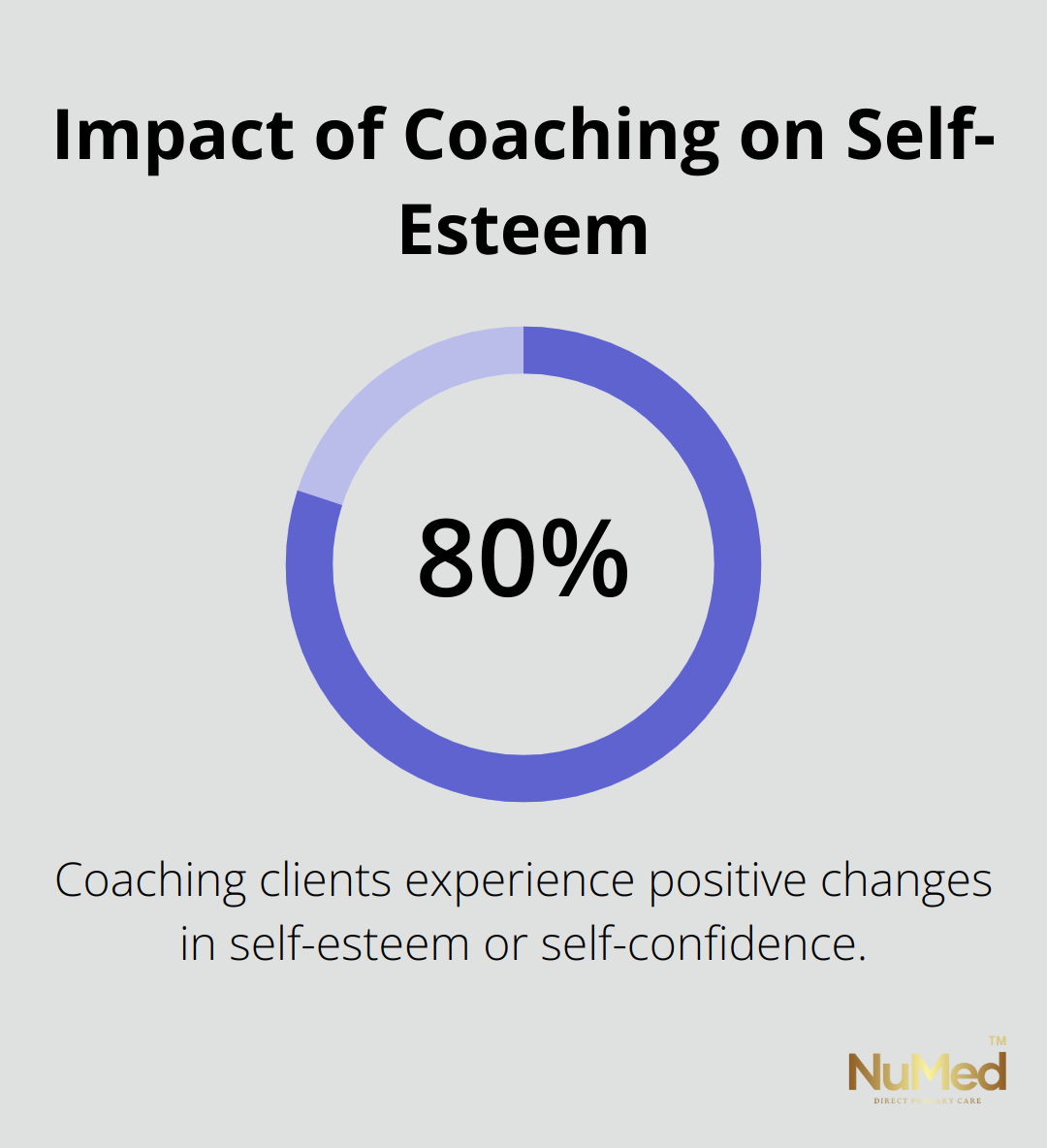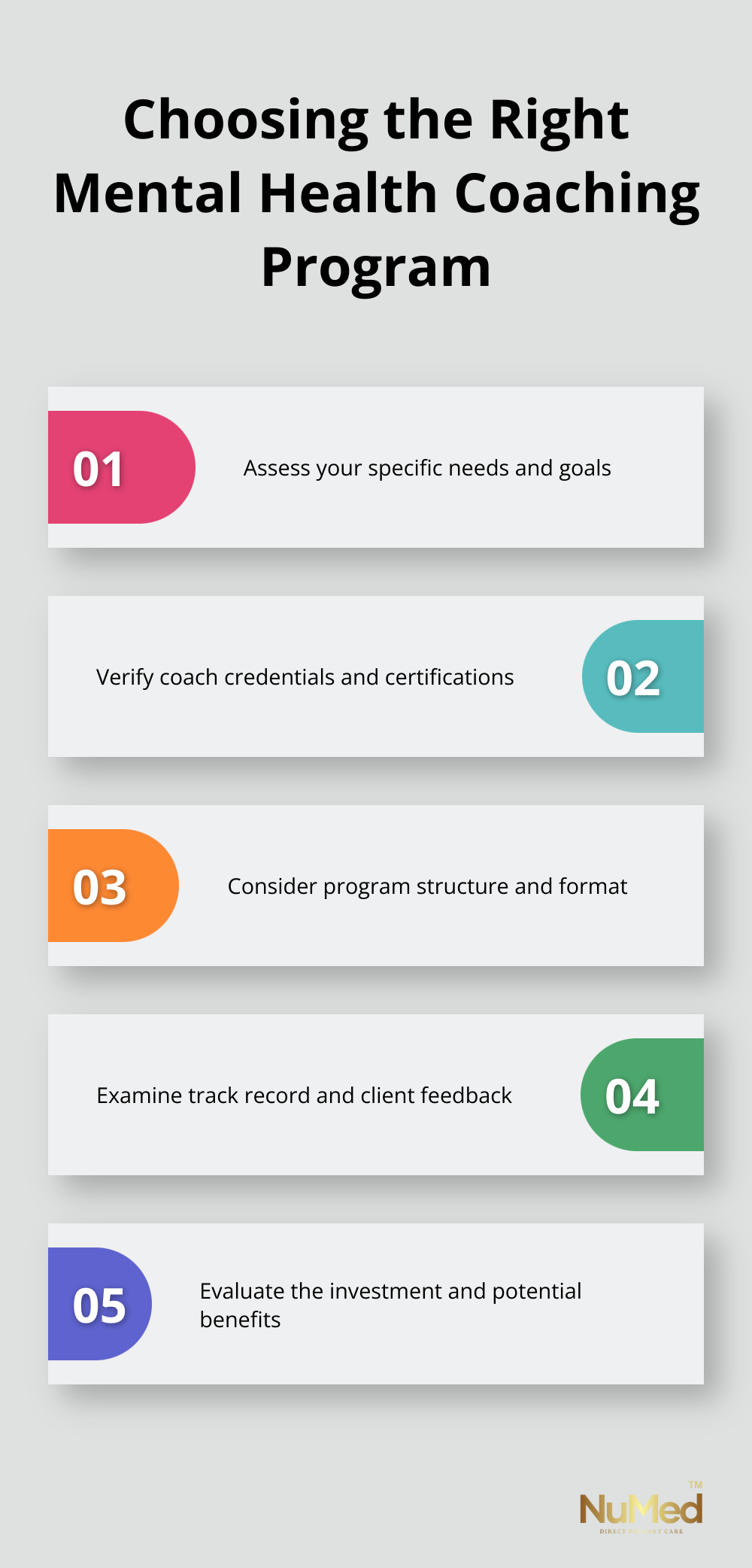Mental health coaching programs are gaining popularity as a powerful tool for personal growth and well-being. At NuMed DPC, we’ve seen firsthand how these programs can transform lives by providing structured support and guidance.
Unlike traditional therapy, mental health coaching focuses on goal-setting, skill-building, and actionable strategies to improve overall mental wellness. In this post, we’ll explore what you need to know about these programs and how they can benefit you.
What Is Mental Health Coaching?
The Essence of Mental Health Coaching
Health and wellness coaching offers a proactive approach to improve emotional well-being and achieve personal goals. This practice involves collaboration with a dedicated partner who guides you through your journey to achieve your personal health goals.
Mental health coaches focus on present-day issues and future aspirations rather than past traumas. They equip clients with practical tools to manage stress, anxiety, and other mental health concerns. A coach might teach mindfulness techniques or help create a personalized self-care routine.
Health and wellness coaches are professionals trained to help individuals achieve lifestyle modifications aimed at improving one’s overall well-being. This approach empowers individuals to take charge of their mental well-being.
Coaching vs. Therapy: Understanding the Distinction
While both coaching and therapy aim to improve mental health, they differ in several key aspects. Therapy often involves diagnosis and treatment of mental health disorders, whereas coaching focuses on enhancing overall well-being and achieving specific goals.
Coaches don’t prescribe medication or provide clinical treatment. Instead, they offer support, accountability, and strategies for personal growth. For example, a coach might help you establish better work-life balance or improve your communication skills.
The Impact of Mental Health Coaching
Mental health coaching yields significant and wide-ranging benefits. A study published in BMC Health Services Research found that coaching methods focused on self-efficacy and self-empowerment can improve mental health outcomes (particularly for individuals not responding to more intense interventions).
Clients often report increased self-confidence, improved stress management, and better overall life satisfaction. The International Coach Federation reports that 80% of coaching clients experience positive changes in self-esteem or self-confidence due to coaching.

Flexibility and Accessibility
Mental health coaching offers flexibility and accessibility. Many programs provide text-based sessions or virtual meetings, allowing clients to receive support at times that suit their schedules. This convenience factor makes it easier for individuals to prioritize their mental health amidst busy lives.
As we explore the key components of effective mental health coaching programs, you’ll gain a deeper understanding of how this approach can transform your life and well-being.
Building Blocks of Successful Mental Health Coaching
Personalized Goal Setting
Successful mental health coaching programs start with clear, achievable goals. Clients who establish specific objectives often see tangible improvements in their mental well-being. Over 70% of those who receive coaching see improvements in their work performance and communication skills, suggesting that coaching could be highly effective for personal development.

Coaches help clients break down larger aspirations into smaller, manageable steps. This approach makes progress more visible and motivates clients to continue their journey. For instance, if a client wants to reduce anxiety, a coach might suggest practicing mindfulness for 10 minutes daily for a week.
Skill Development and Coping Strategies
Mental health coaches equip clients with practical tools to navigate life’s challenges. These may include stress management techniques, communication skills, or methods for improving emotional regulation.
Coaches often introduce evidence-based practices like cognitive-behavioral techniques or mindfulness exercises. For example, a coach might teach a client how to use the 5-4-3-2-1 grounding technique to manage anxiety attacks effectively.
Accountability and Support
Regular check-ins and progress tracking form crucial components of successful mental health coaching programs. Coaches provide a supportive environment where clients feel comfortable discussing their challenges and celebrating their wins. This accountability factor significantly increases the likelihood of clients sticking to their goals and making lasting changes.
Integration of Evidence-Based Practices
Effective mental health coaching programs incorporate scientifically-backed methods to ensure the best outcomes for clients. Coaches stay up-to-date with the latest research in psychology and wellness to provide the most effective strategies.
For instance, many coaches use principles from Acceptance and Commitment Therapy (ACT) or Motivational Interviewing to help clients overcome obstacles and achieve their goals. These evidence-based approaches (when combined with the coach’s expertise) create a powerful framework for personal growth and improved well-being.
As we explore how to choose the right mental health coaching program, you’ll discover how these building blocks come together to create a transformative experience tailored to your unique needs and goals.
How to Select the Best Mental Health Coaching Program
Assess Your Specific Needs
You should start by defining what you want to achieve through mental health coaching. Do you want to manage stress, improve relationships, or boost self-confidence? Write down your top three goals and use them as a guide when you evaluate different programs.
Mental health coaching can help individuals address various life challenges, from stress management to healthy routines and effective communication. If these align with your objectives, you should look for programs that emphasize these areas.
Verify Coach Credentials
The qualifications of your mental health coach will significantly impact the effectiveness of the program. You should look for coaches certified by reputable organizations such as the International Coach Federation (ICF) or the National Board for Health & Wellness Coaching (NBHWC).
While no formal licensure is required, specialized training in coaching is needed. Licensed professionals who have undergone rigorous training and certification are available to choose from.
Consider Program Structure
You should evaluate the format and duration of the coaching program. Some programs offer weekly sessions, while others might provide bi-weekly or monthly check-ins. Consider your schedule and commitment level when you make a choice.

Many mental health coaching programs now offer virtual sessions, which provide flexibility and accessibility.
Examine Track Record and Client Feedback
You should look for programs with a proven track record of success. Read testimonials and ask for references from past clients. This firsthand information can provide valuable insights into the program’s effectiveness and the coach’s approach.
Evaluate the Investment
You should consider the cost of the program in relation to its potential benefits. Factor in these costs when you budget for your mental health coaching program.
Final Thoughts
Mental health coaching programs offer a powerful avenue for personal growth and well-being. These programs provide structured support, goal-oriented strategies, and practical tools to empower individuals to take charge of their mental health journey. The personalized approach ensures that each client receives tailored support to address their unique challenges and aspirations.
At NuMed DPC, we understand the transformative potential of mental health coaching. Our comprehensive healthcare approach includes health coaching services that complement our direct primary care model. We focus on preventing illness by addressing root causes and fostering a strong patient-practitioner relationship.
We encourage you to take the next step in prioritizing your mental health. Explore the options available to you, consider your personal needs and goals, and reach out to professionals who can support you on your journey. With the right mental health coaching program, you can unlock your potential for growth, resilience, and lasting well-being.
















